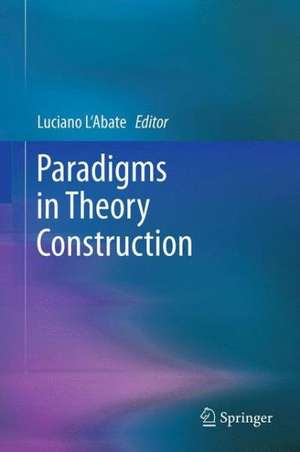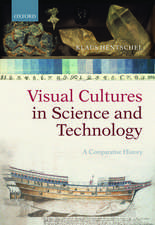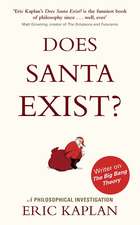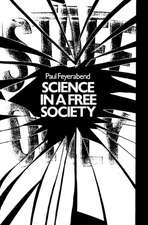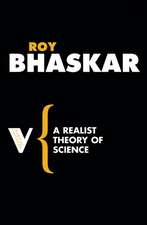Paradigms in Theory Construction
Editat de Luciano L'Abateen Limba Engleză Paperback – 2 mar 2014
| Toate formatele și edițiile | Preț | Express |
|---|---|---|
| Paperback (1) | 952.89 lei 6-8 săpt. | |
| Springer – 2 mar 2014 | 952.89 lei 6-8 săpt. | |
| Hardback (1) | 959.04 lei 6-8 săpt. | |
| Springer – 30 noi 2011 | 959.04 lei 6-8 săpt. |
Preț: 952.89 lei
Preț vechi: 1162.06 lei
-18% Nou
Puncte Express: 1429
Preț estimativ în valută:
182.33€ • 190.37$ • 150.91£
182.33€ • 190.37$ • 150.91£
Carte tipărită la comandă
Livrare economică 04-18 aprilie
Preluare comenzi: 021 569.72.76
Specificații
ISBN-13: 9781489999597
ISBN-10: 1489999590
Pagini: 472
Ilustrații: XIV, 458 p.
Dimensiuni: 155 x 235 x 25 mm
Greutate: 0.66 kg
Ediția:2012
Editura: Springer
Colecția Springer
Locul publicării:New York, NY, United States
ISBN-10: 1489999590
Pagini: 472
Ilustrații: XIV, 458 p.
Dimensiuni: 155 x 235 x 25 mm
Greutate: 0.66 kg
Ediția:2012
Editura: Springer
Colecția Springer
Locul publicării:New York, NY, United States
Public țintă
ResearchDescriere
Within the field of psychology there is a proliferation of paradigms, theories, models, and dimensions without an underlying conceptual framework or theory. This conclusion has been reached by representatives of many different psychological specialties.In response to this inconsistency this book presents a hierarchical framework about important theoretical issues that are present in psychological thinking. These issues concern definitions of three major theoretical concepts in theory and practice: (a) paradigms, (b) theories, and (c) models. It focuses on defining, comparing, and contrasting these three conceptual terms.This framework clarifies differences among paradigms, theories, and models, terms which have become increasingly confused in the psychological literature. Paradigms are usually confused with theories or with models while theories are confused with models. Examples of misuses of these terms suggest the need for a hierarchical structure that views paradigms as conceptual constructions overseeing a variety of psychological theories and verifiable models.
Cuprins
Paradigms in Science and Theory Construction.- Paradigms in Science: A Historical Perspective.- Evolving Paradigms: Retrospective and Prospection.- Anthropology.- Parallel Paradigms of Artists and Authors.- Economics.- Education.- Sociology.- The Biopsychosocial Paradigm.- Interbehaviorism.- Reflections on Personality Systematics and an Unified Clinical Science.- The Intersubjective-narrative Approach versus the Relational-generational one.- Constructivism.- Materialism.- Explicating and Exemplifying Empicist and Cognitivist Paradigms in the study of Human Learning.- Humanism and Behaviorism.- Existentialism.- Information Processing.- Reductionism.- Produced and Spontaneous Emergent Interactionism.- The Emergence of Reason, Intelligence, and Language in Humans and Animals.- Essentialism.- Criteria and Processes in Paradigm Selection.
Notă biografică
Since his retirement in 1990, Luciano L’Abate, Ph.D. has been Professor Emeritus at Georgia State University where he was previously a Professor of Psychology beginning in 1965. L’Abate has been an editorial board member of many national and foreign professional and scientific journals, as well as a consultant to various publishing houses. He is the author and co-author of over 300 papers, chapters, and book reviews in professional journals in addition to authoring/editing 34 books. His work has been translated into Chinese, Japanese, Finnish, Spanish, French, Polish, and German languages. Dr. L’Abate is the recipient of many awards including "Family Psychologist of the Year for 1994" by Division 43 of the American Psychological Association, "Outstanding Contribution" by the Georgia Association for Marriage and Family Therapy, and "Outstanding Citizen" by the House of Representatives in the State of Georgia. He has also held workshops and lectured extensively in the United States, Australia, Canada, New Zealand, Japan, Germany, Spain, and Italy. Dr. L’Abate has spent the last several years involved full-time in writing and research since his retirement from Georgia State University.
Textul de pe ultima copertă
Paradigms in Theory Construction
Luciano L’Abate, editor
Without the framework of the paradigm supporting layers of theories,models, and data, our concept of science, and its shared mode of scholarly thought, would not exist. The concept is readily understood. But how did we get there?
Paradigms in Theory Construction classifies the collective worldviews that inform paradigms and clarifies the relationships between them, theories, and models in psychology, the hard sciences,and the social sciences. The book skillfully merges the philosophy of science with the history of scientific inquiry to explain how ideas take hold among populations,how paradigms are structured, whether they are based in logic, and under what circumstances paradigm shifts occur. Rich with historical and contemporary examples across disciplines, chapters examine the function of the paradigm for the community of scholars in major arenas of scientific pursuit, among them:
Luciano L’Abate, editor
Without the framework of the paradigm supporting layers of theories,models, and data, our concept of science, and its shared mode of scholarly thought, would not exist. The concept is readily understood. But how did we get there?
Paradigms in Theory Construction classifies the collective worldviews that inform paradigms and clarifies the relationships between them, theories, and models in psychology, the hard sciences,and the social sciences. The book skillfully merges the philosophy of science with the history of scientific inquiry to explain how ideas take hold among populations,how paradigms are structured, whether they are based in logic, and under what circumstances paradigm shifts occur. Rich with historical and contemporary examples across disciplines, chapters examine the function of the paradigm for the community of scholars in major arenas of scientific pursuit, among them:
- The impact of paradigms on the evolution of science.
- Paradigms in educational theory and practice.
- Artistic, verbal, and visual paradigms.
- General-integrative paradigms, including biopsychosocial, interbehavioral, constructionism, and materialism.
- Particular-specific paradigms: humanism, behaviorism, existentialism, and others.
- The emergence of reason, intelligence, and language.
- Among all the paradigms included in this volume, information processing has become the reigning paradigm for this century.
Caracteristici
Presents a hierarchical framework for constructing psychological theories
Reviews the history of psychological theory building
Compares and contrasts often confused conceptual terms
Includes supplementary material: sn.pub/extras
Reviews the history of psychological theory building
Compares and contrasts often confused conceptual terms
Includes supplementary material: sn.pub/extras
